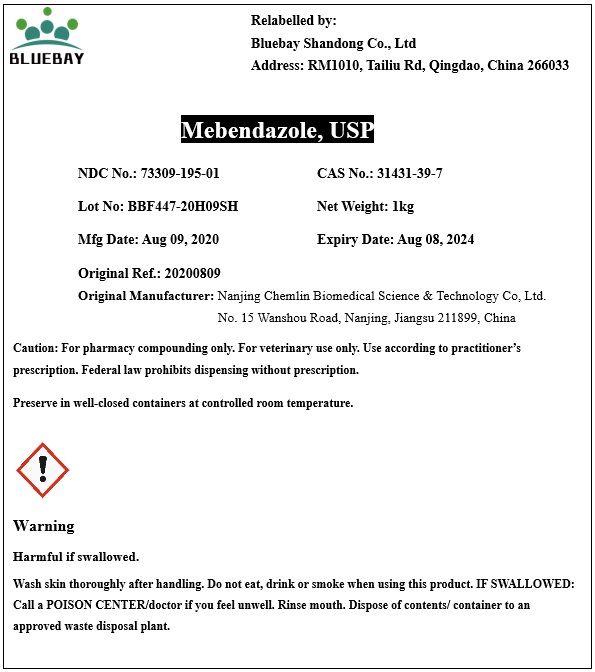Mebendazole
Generic name: mebendazole
Brand names: Emverm, Vermox
Dosage form: oral tablet, chewable (100 mg)
Drug class: Anthelmintics
Medically reviewed by A Ras MD.
What is mebendazole?
Mebendazole is a prescription medicine that is used to treat infections caused by worms.
Description
Mebendazole is an orally administered, synthetic anthelmintic available as chewable tablets, each containing 100 mg of mebendazole. Inactive ingredients are: colloidal silicon dioxide, corn starch, hydrogenated vegetable oil, magnesium stearate, microcrystalline cellulose, sodium lauryl sulfate, sodium saccharin, sodium starch glycolate, talc, tetrarome orange, and FD&C yellow No.6.
Chemically, mebendazole is methyl 5-benzoylbenzimidazole-2-carbamate with a molecular formula of C16H13N3O3 and the following structural formula:
 |
Mebendazole is a white to slightly yellow powder with a molecular weight of 295.29. It is less than 0.05% soluble in water, dilute mineral acid solutions, alcohol, ether and chloroform, but is soluble in formic acid.
Before taking mebendazole, tell your doctor:
- If you are allergic to mebendazole; any part of this medicine; or any other drugs, foods, or substances. Tell your doctor about the allergy and what signs you had.
- If you are taking metronidazole.
This is not a list of all drugs or health problems that interact with mebendazole.
Tell your doctor and pharmacist about all of your drugs (prescription or OTC, natural products, vitamins) and health problems. You must check to make sure that it is safe for you to take mebendazole with all of your drugs and health problems. Do not start, stop, or change the dose of any drug without checking with your doctor.
What are some things I need to know or do while I take mebendazole?
- Tell all of your health care providers that you take mebendazole. This includes your doctors, nurses, pharmacists, and dentists.
- Have your blood work checked if you are on mebendazole for a long time. Talk with your doctor.
- Low white blood cell counts and liver problems have happened when mebendazole was taken for a long time and at doses higher than normal. Talk with the doctor.
- Do not use more than what your doctor told you to use. Do not use more often or longer than what you were told. Doing any of these things may raise the chance of very bad side effects.
- Tell your doctor if you are pregnant or plan on getting pregnant. You will need to talk about the benefits and risks of using mebendazole while you are pregnant.
- Tell your doctor if you are breast-feeding. You will need to talk about any risks to your baby.
How is mebendazole best taken?
Use mebendazole as ordered by your doctor. Read all information given to you. Follow all instructions closely.
- Chew well before swallowing.
- Take with or without food.
- Some products must not be swallowed whole. For some products, it does not matter. There are also other ways to take mebendazole if not able to chew it. Be sure you know how mebendazole needs to be taken. If you are not sure, check with the pharmacist.
- Keep taking mebendazole as you have been told by your doctor or other health care provider, even if you feel well.
What do I do if I miss a dose?
- Take a missed dose as soon as you think about it.
- If it is close to the time for your next dose, skip the missed dose and go back to your normal time.
- Do not take 2 doses at the same time or extra doses.
What are the side effects of mebendazole that I need to call my doctor about immediately?
WARNING/CAUTION: Even though it may be rare, some people may have very bad and sometimes deadly side effects when taking a drug. Tell your doctor or get medical help right away if you have any of the following signs or symptoms that may be related to a very bad side effect:
- Signs of an allergic reaction, like rash; hives; itching; red, swollen, blistered, or peeling skin with or without fever; wheezing; tightness in the chest or throat; trouble breathing, swallowing, or talking; unusual hoarseness; or swelling of the mouth, face, lips, tongue, or throat.
- Seizures.
What are some other side effects of mebendazole?
All drugs may cause side effects. However, many people have no side effects or only have minor side effects. Call your doctor or get medical help if any of these side effects or any other side effects bother you or do not go away:
- Belly pain.
- Diarrhea.
- Not hungry.
- Gas.
- Upset stomach or throwing up.
These are not all of the side effects that may occur. If you have questions about side effects, call your doctor. Call your doctor for medical advice about side effects.
You may report side effects to the FDA at 1-800-332-1088. You may also report side effects at https://www.fda.gov/medwatch.
If overdose is suspected:
If you think there has been an overdose, call your poison control center or get medical care right away. Be ready to tell or show what was taken, how much, and when it happened.
How do I store and/or throw out mebendazole?
- Store at room temperature.
- Store in a dry place. Do not store in a bathroom.
- After opening, be sure you know how long the product is good for and how to store it. Ask the doctor or pharmacist if you are not sure.
- Keep all drugs in a safe place. Keep all drugs out of the reach of children and pets.
- Throw away unused or expired drugs. Do not flush down a toilet or pour down a drain unless you are told to do so. Check with your pharmacist if you have questions about the best way to throw out drugs. There may be drug take-back programs in your area.
Label
MEBENDAZOLE

SRC: NLM .
